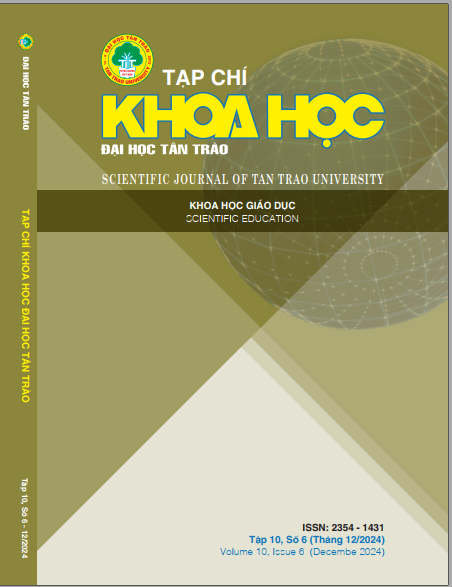FACTORS INFLUENCING THE SPEECH ACT OF REFUSALS OF OFFERS BY NATIVE SPEAKERS OF AMERICAN ENGLISH AND VIETNAMESE PEOPLE
DOI:
https://doi.org/10.51453/2354-1431/2024/1208Keywords:
Keywords: speech acts, factors, offers, the speech act of offers, language instructionAbstract
Refusal speech acts are prevalent across all languages. Similar to other speech acts, declining of an offer is affected by linguistic and cultural factors. The formulations for expressing declination vary between languages and civilizations due to distinct linguistic features and cognitive patterns linked to each society. These result in misinterpretations and disputes in intercultural communication. The paper examines factors influencing the strategies by which Americans and Vietnamese decline offers. All data have been collected and categorized from over eighty Vietnamese and American literary works and films in two languages. By identifying the factors that affect the rejection of offers, the authors aim to furnish insights regarding the determinants influencing how individuals decline offers, thereby contributing to the enhancement of English language instruction in Vietnam and the teaching of Vietnamese to foreigners.
Downloads
References
Brown P. & Levinson S.(1978).Universals in language usage: Politeness phenomena. Cambridge University Press.
Brown, P. & Levinson, S. (1987). Politeness: Some universals in language usage. Cambridge, MA Thesis, M. I. T. Press.
Chodorow, N, (1978). The reproduction of mothering: Psychoanalysis and the sociology of gender. Berkeley, CA: University of California Press.
Gilligan, C. (1982). In a different voice: Psychological theory and women's development. Cambridge MA: Harvard University Press.
Hoàng Phê (2006). Từ điển tiếng Việt. NXB Đà Nẵng, Đà Nẵng.
Holmes. J (1995). Women, men and Politeness, Longman. London and New York.
Hornby, A. S (2003). Oxford Advanced Learner’s Dictionary. Oxford University Press.
Mallz, D. N., & Borker, R. A, (1982). A cultural approach to male-female miscommunication In J. J. Gumperz (Ed.). Language and social identity (pp. 196-216), Cambridge: Cambridge University Press.
McGlone, J, (1980). Sex differences in human brain asymmetry: A critical survey, Behavioral and Brain Sciences. 3(2), pp.215–263.
Nguyễn Quang (2002). Giao tiếp và giao tiếp giao văn hóa. NXB đại học Quốc gia, Hà Nội.
Nguyễn Quang (2004). Một số vấn đề giao tiếp nội văn hóa và giao văn hóa. NXB ĐHQG Hà Nội, Hà Nội.
Tannen, D. (1990). You just don’t understand: Men and women in conversation. William Morrow & Company, New York.
West, C., & Zimmerman, D. H, (1987). Doing Gender, Gender and Society. 1 (pp.125-151). http://dx.doi.org/10.1177/0891243287001002002
Text corpus
Colleen McCullough (1977). The Thornbird. Harper & Row; Book Club edition.
Duyên Anh (1967). Vết thù hằn trên lưng con ngựa hoang. Retrieved from https://duyenanhvumonglong.wordpress.com/category/truyen-dai/1967-vet-thu-han-tren-lung-con-ngua-hoang.
Erich Segal (1970). Love story. Coronet Books, Hodder Paperbacks Ltd.
Fredrick Forsyth (1997). Icon. Corgi books.
Jojo Moyes (2012). Me before you. Pamela Dorman Books.
Lê Văn Trương (2011). Trận đời. NXB Văn học, Hà Nội.
Mario Puzo (1983). The Godfather. Berkley.
Nguyễn Công Hoan (2014). Bước đường cùng. NXB Văn học, Hà Nội.
Nguyễn Như Phong (2005). Chạy án tập 2. NXB Công an nhân dân, Hà Nội.
Nhất Linh (1997). Đoạn tuyệt. NXB Văn học, Hà Nội.
Nguyễn Trương Thiên Lý (2015). Ván bài lật ngửa. NXB trẻ, TP Hồ Chí Minh.
Oscar Wilde (2000). An Ideal Husband. Dover Publications Inc, London.
Sidney Sheldon (1995a). Nothing Lasts forever. Grand Central Publishing.
Sidney Sheldon (1995b). The Stars Shine Down. HarperCollins Publishers.
Sidney Sheldon (1999). Rage of Angles. HarperCollins Publishers.
Downloads
Published
How to Cite
Issue
Section
License

This work is licensed under a Creative Commons Attribution-ShareAlike 4.0 International License.
All articles published in SJTTU are licensed under a Creative Commons Attribution-ShareAlike 4.0 International (CC BY-SA) license. This means anyone is free to copy, transform, or redistribute articles for any lawful purpose in any medium, provided they give appropriate attribution to the original author(s) and SJTTU, link to the license, indicate if changes were made, and redistribute any derivative work under the same license.
Copyright on articles is retained by the respective author(s), without restrictions. A non-exclusive license is granted to SJTTU to publish the article and identify itself as its original publisher, along with the commercial right to include the article in a hardcopy issue for sale to libraries and individuals.
Although the conditions of the CC BY-SA license don't apply to authors (as the copyright holder of your article, you have no restrictions on your rights), by submitting to SJTTU, authors recognize the rights of readers, and must grant any third party the right to use their article to the extent provided by the license.


